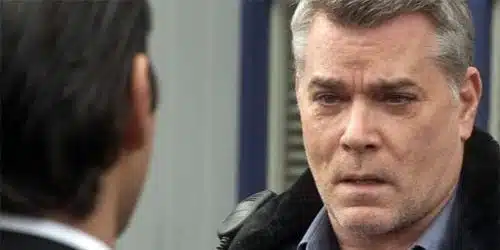
What a tired, pitiful little movie Suddenlyis. With its grating loop of the picture’s overbearing score playing over the main menu, it seems to have been sighed into existence. Many viewers will recognize that the title signals a remake of the thriller starring Sterling Hayden as a small-town sheriff opposite a rare villainous turn from Frank Sinatra as a would-be presidential assassin. What the title mostly signals, though, is really that a conversation once took place about how to make a film that would grab viewers’ attention at the rental store, and then never again.
How bereft of thrills, this thriller! Its script lacks a third act, in fact it lacks acts at all. The lawman played in this incarnation by Ray Liotta makes a short speech near the climax that in any other picture would trigger a significant reconfiguration of the main characters’ relationships, and lend greater meaning to the final, violent confrontation between hero and villain. Instead, the moment is quickly forgotten once tears have been shed; the brawl which concludes the story little more than a tussle, no more than two or three shots before bang-bang, and the anonymous voice of a local news anchor lets the audience know whether the president got away.
Director Uwe Boll has spent the better part of his career trying to make bad press work for him, to often diverting returns, as when he boorishly challenged his harshest critics to boxing matches and twice followed through. Boll remains an easy target of vociferous criticism and undue sarcasm. He’s the sort of filmmaker who has no critical standing to diminish and therefore can be belittled with relative impunity. His new picture, however, beggars not snark but indifference. It inspires only sympathy for those involved with its production, some of whom will go on to make better ones but probably never live down the shame of such strident mediocrity. Here is a movie no one ever cared about getting right.
Boll has an apt personification of Suddenly’s particular, depressing quality in his lead actor. Ray Liotta has made something of a late career out of lending credibility to bad films, as he did with this year’s earlier The Devil’s in the Details, some lunkheaded paean to incoherent plotting which was at least memorable in its furious commitment to pain and in its ugliness of spirit. Here, he is convincing as a man who once acted in great films by Martin Scorsese and Jonathan Demme, fruitful collaborations that brought out the best work he had to offer, and now trudges through a vacant script with only the memory of past roles to comfort him.
One could suggest that he has fallen on hard times and directors capable of drawing out his talents are farther between these days, but the likelier answer is that his well of passion has run dry. A glance at his CV inspires a weak chill and makes one reach for a glass of warm milk; compare the 34 credits Nicolas Cage has rung up since the year 2000 to Liotta’s 55. Bad luck aside (the few name directors Liotta has worked under this century, including Derek Cianfrance, Dito Montiel, and Andrew Dominik, have all churned out career worsts with him), Cage never sauntered through a turkey quite so dejectedly. Here is what it looks like when a performer gives up.
The villain played by Dominic Purcell does not attempt to live up to the scene-stealing turn by Sinatra in the original, and comes off the better for it. He memorizes his lines and speaks them slowly enough for the audience to understand, never feeling the need to suggest that the work is worthy of anyone’s time. Liotta, tasked with really acting a scene or two, looks humiliated, beaten, as must anyone who watches this new Suddenly to completion.
This may be the worst picture that Boll has made, an outlandish statement considering the tasteless skewering of 9/11 and Middle Eastern politics that made his Postal a buzzword upon release. In the past, Boll has at least attempted to make bad films with a modicum of personality. His Suddenly, to paraphrase Mel Brooks, rises below mediocrity, a film that has not the liveliness to offend, surprise, engage, or even to amuse.
It would be a meek film, had it not the cynicism to ask consumers to pay good money to have their time wasted. It deserves not your cash but your pity. This is cinema made to pay the electric bill; great films have been made with such lowly motivations, but no one here seemed to pay that any mind.
Extras: None.

